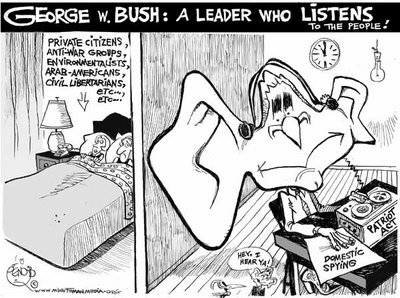Another Year of Distorted Election Coverage
Source:
In These Times, 02/15/05
Title: “A Corrupted Election”
Authors: Steve Freeman and Josh Mitteldorf
Seattle Post-Intelligencer, January 26, 2005
Title: “Jim Crow Returns To The Voting Booth”
Authors: Greg Palast, Rev. Jesse Jackson
www.freepress.org, Nov. 23, 2004
Title: “How a Republican Election Supervisor Manipulated the 2004 Central Ohio Vote”
Authors: Bob Fitrakis, Harvey Wasserman
Faculty Evaluator: Ann Neel, MA
Student Researcher: Mike Osipoff
Political analysts have long counted on exit polls to be a reliable predictor of actual vote counts. The unusual discrepancy between exit poll data and the actual vote count in the 2004 election challenges that reliability. However, despite evidence of technological vulnerabilities in the voting system and a higher incidence of irregularities in swing states, this discrepancy was not scrutinized in the mainstream media. They simply parroted the partisan declarations of “sour grapes” and “let’s move on” instead of providing any meaningful analysis of a highly controversial election.
The official vote count for the 2004 election showed that George W. Bush won by three million votes. But exit polls projected a victory margin of five million votes for John Kerry. This eight-million-vote discrepancy is much greater than the error margin. The overall margin of error should statistically have been under one percent. But the official result deviated from the poll projections by more than five percent—a statistical impossibility.
Edison Media Research and Mitofsky International, the two companies hired to do the polling for the Nation Election Pool (a consortium of the nation’s five major broadcasters and the Associated Press), did not immediately provide an explanation for how this could have occurred. They waited until January 19, the eve of the inauguration.
Edison and Mitofsky’s “inaugural” report, “Evaluation of Edison/Mitofsky Election System 2004,” stated that the discrepancy was “most likely due to Kerry voters participating in the exit polls at a higher rate than Bush voters.” The media widely reported that this report proved the accuracy of the official count and a Bush victory. The body of the report, however, offers no data to substantiate this position. In fact, the report shows that Bush voters were more likely to complete the survey than Kerry voters. The report also states that the difference between exit polls and official tallies was far too great to be explained by sampling error, and that a systematic bias is implicated.
The Edison and Mitofsky report dismisses the possibility that the official vote count was wrong, stating that precincts with electronic voting systems had the same error rates as precincts with punch-card systems. This is true. However, it merely points to the unreliability of punch-card and electronic systems, both of which are slated for termination under the Helping America Vote Act of 2002. According to the report, only in precincts that used old-fashioned, hand-counted paper ballots did the official count and the exit poll data fall within the normal margin of error.
Also, the report shows, the discrepancy between the exit polls and the official count was considerably greater in the critical swing states. And while this fact is consistent with allegations of fraud, Mitofsky and Edison suggest, without providing any data or theory to back up their claim, that this discrepancy is somehow related to media coverage.
In precincts that were at least 80 percent for Bush, the average within-precinct error (WPE) was a whopping 10.0 percent—the numerical difference between the exit poll predictions and the official count. Also, in Bush strongholds, Kerry received only about two-thirds of the votes predicted by exit polls. In Kerry strongholds, exit polls matched the official count almost exactly (an average WPE of 0.3).
This exit poll data is a strong indicator of a corrupted election. But the case grows stronger if these exit poll discrepancies are interpreted in the context of more than 100,000 officially logged reports of irregularities and possible fraud during Election Day 2004.
Bush campaign officials compiled a 1,886-name “caging list,” which included the names and addresses of predominantly black voters in the traditionally Democratic Jacksonville, Florida. While Bush campaign spokespersons stated that the list was a returned mail log, they did not deny that such a list could be used to challenge voters on Election Day. In fact, the county elections supervisor says that he could see no other purpose for compiling such a list.
In Franklin County Ohio, Columbus voters faced one of the longest ballot lines in history. In many inner city precincts, voters sometimes had three-hour waits to get to the poll before being required to cast ballots within five minutes, as demanded by the Republican-run Board of Elections. Seventy-seven out of the county’s 2,866 voting machines malfunctioned on Election Day. One machine registered 4,258 votes for Bush in a precinct where only 638 people voted. At least 125 machines were held back at the opening of the polls, and another 68 were never deployed. While voters were rushed through the process, 29 percent of the precincts had fewer voting machines than in the 2000 election despite a 25 percent increase in turnout.
Taken together, these problems point to an election that requires scrutiny. Even if the discrepancy between exit polls and actual vote counts is simply a fluke, other flaws and questionable practices in the voting process make one wonder whether or not the people’s voice was actually heard and if we are truly a working democracy.
Update by Josh Mitteldorf: Some news is too important to report. People might get upset, and the smooth functioning of our democracy would be jeopardized. Thus the media has collectively done the responsible thing, and refrained—at great cost to themselves, be assured—from publicizing doubts about the legitimacy of the 2004 election, in order to help assure the “orderly succession of power.”
Unfortunately, some internet sites such as Commondreams.org and Freepress.org do not realize their obligations to the commonwealth, and have thus been less responsible in maintaining silence. And there’s an upbeat radio voice from Vermont, Thom Hartmann, who would be fun to listen to if only he didn’t insist on relating so many discomfiting truths.
But so long as you stay away from these isolated derelicts, you will be gratified to receive a reassuringly consistent story line: George Bush won the 2004 election fair and square. It’s time to stop asking pointless questions. Get with the program!
Update by Greg Palast and Reverend Jessie Jackson: There are conspiracy nuts out there on the Internet who think that John Kerry defeated George Bush in Ohio and other states. I know, because I wrote “Kerry Won” for TomPaine.com two days after the election.
“Kerry Won” was the latest in a series coming out of a five-year investigation, begun in November 2000, for BBC Television Newsnight and Britain’s Guardian papers, dissecting that greasy sausage called American electoral democracy.
On November 11, a week after TomPaine.com put the report out on the ‘Net, I received an email from the New York Times Washington Bureau. Hot on the investigation of the veracity of the vote, the Times reporter asked me pointed questions:
Question #1: Are you a “sore loser”?
Question #2: Are you a “conspiracy nut”?
There was no third question. Investigation of the vote was, apparently, complete. The next day, their thorough analysis of the evidence yielded a front-page story, “VOTE FRAUD THEORIES, SPREAD BY BLOGS, ARE QUICKLY BURIED.”
Here’s a bit of what the Paper of Record failed to record.
In June 2004, well before the election, my co-author of “Jim Crow” Rev. Jesse Jackson brought me to Chicago. We had breakfast with Vice-Presidential candidate John Edwards. The Reverend asked the Senator to read my report of the “spoilage” of Black votes—one million African Americans who cast ballots in 2000 but did not have their votes register on the machines.
Edwards said he’d read it over after he’d had his bagel. Jackson snatched away his bagel. No read, no bagel. A hungry Senator was genuinely concerned—these were, after all, Democrats whose votes did not tally, and he shot the information to John Kerry. A couple of weeks later, Kerry told the NAACP convention that one million African-American votes were not counted in 2000, but in 2004 he would not let it happen again.
But he did let it happen again. More than a million votes in 2004 were cast and not counted.
As a reporter, it’s not my job to help the Democratic Party learn to tie its shoes. And, as a nonpartisan journalist, I’m not out to expose the Republican Party’s new elaborate campaign to prevent voters from voting—but I must report it. However, editors and news producers in my home country, the USA, seem less than interested. Indeed, they are downright hostile to reporting this story of the shoplifting of our democracy.
America has an apartheid voting system, denying African-Americans, Hispanics and American Natives the assurance their ballots will count. Worse, America has an apartheid media which denies racial disenfranchisement a seat at the front of the news bus.
It was in November 2000 I first ran into the U.S. news lord’s benign neglect of the “new Jim Crow” methods of denying citizens of color their vote. While working with the British Guardian papers just days before the 2000 presidential election, I discovered that Governor Jeb Bush and his Secretary of State, Katharine Harris, had wrongly purged tens of thousands of Black citizens from voter rolls as “felons”—when in fact their only crime had been V.W.B.: Voting While Black.
Nothing appeared in the U.S. press. However, I admit that the Florida purge story was picked up by the New York Times … fofur years later.
Just before the November 2004 election, BBC television Newsnight discovered new, confidential “caging lists” which we got our hands on from inside the Republican National Committee headquarters. These were rosters of thousands of minority voters targeted to prevent them from voting on election day: a violation of federal law. It was big news in Europe and South America. In the USA, there was nothing except an attack on BBC’s report by ABC’s web site. ABC’s only listed source for their attack on the BBC was the Republican Party.
The story of the purge of Black voters, the million missing Black ballots cast but not counted, the caging lists, and other games used to deny the vote to the dark-skinned and the poor, would have been buried long ago if not for BBC Television, Harper’s Magazine (may it last a thousand years), Britain’s Guardian and Observer, The Nation, the op-ed editors at the San Francisco Chronicle and Seattle Post-Intelligencer and, provocatively, Hustler Magazine. Even if ignored or actively ‘dissed by U.S. “mainstream” media, the story will be continue to be reported, due to the passionate insistence of Reverend Jackson, from a thousand pulpits.
Thanks to GeorgeBush.com for capturing the ‘caging lists.’ And bless the blogs, for they shall set the truth free: TomPaine.com, Buzzflash, Working-for-Change and other Internet sites carried the story over the electronic Berlin Wall.
Finally, my gratitude to our indefatigable investigative team, particularly Oliver Shykles and Matt Pascarella for their work on this story—on which they continue today—and to Meirion Jones, producer nonpareil at BBC television’s Newsnight.
For Additional Documentation of Voter Fraud 2004 See Chapters 2 and 3.






